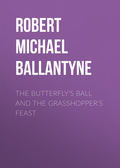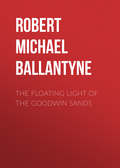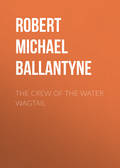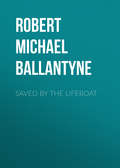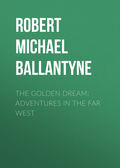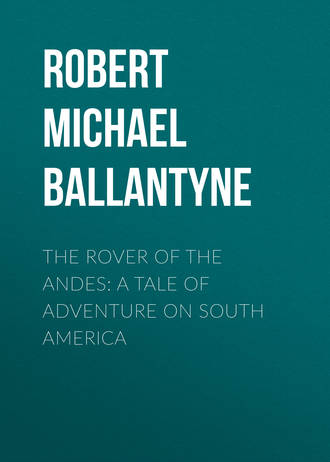
Robert Michael Ballantyne
The Rover of the Andes: A Tale of Adventure on South America
Chapter Twenty Nine.
Describes several Mysterious Meetings and Conversations
Descriptions, however graphic or faithful, are for the most part misleading and ineffective. Who ever went to a town or a region, and found it to resemble the picture of it which had been previously painted on his imagination by description?
For an account of Buenos Ayres we refer the inquiring reader to other books.
Our business at present is with Quashy and “Sooz’n.”
That sable and now united couple stand under the shade of a marble colonnade watching with open-mouthed interest the bustle of the street in which men and women of many nations—French, Italian, Spanish, English, and other—are passing to and fro on business or pleasure.
This huge, populous town was not only a new sight, but an almost new idea to the negroes, and they were lost alike in amusement and amazement.
“Hi!” exclaimed Quashy in his falsetto, “look, look dar, Sooz’n—das funny.”
He pointed to a little boy who, squatted like a toad on a horse’s back, was galloping to market with several skins of milk slung on either side of the saddle, so that there was no room for his legs.
“O Quash!” exclaimed the bride, “dar’s pumpkins for you. Look!”
They were indeed notable pumpkins—so large that five of them completely filled a wagon drawn by two oxen.
“But come, Sooz’n, da’ling,” said Quashy, starting as if he had just recollected something, “you said you was gwine to tell me suffin as would make my hair stan’ on end. It’ll be awrful strong if it doos dat, for my wool am stiff, an’ de curls pritty tight.”
“Yes, I comed here wid you a-purpose to tell you,” replied the bride, “an’ to ax your ’pinion. But let’s go ober to dat seat in de sun. I not like de shade.”
“Come along, den, Sooz’n. It’s all one to me where we goes, for your eyes dey make sunshine in de shade, an’ suffin as good as shade in de sunshine, ole gurl.”
“Git along wid your rubbish!” retorted Susan as they crossed the street. It was evident, however, that she was much pleased with her gallant spouse.
“Now, den dis is what I calls hebben upon art’,” said Quashy, sitting down with a contented sigh. “To be here a-frizzlin’ in de sunshine wid Sooz’n a-smilin’ at me like a black angel. D’you know, Sooz’n,” he added, with a serious look, “it gibs me a good deal o’ trouble to beliebe it.”
“Yes, it am awrful nice,” responded Susan, gravely, “but we’s not come here to make lub, Quashy, so hol’ your tongue, an’ I’ll tell you what I heared.”
She cleared her throat here, and looked earnest. Having thus reduced her husband to a state of the most solemn expectancy, she began in a low voice—
“You know, Quashy, dat poor Massa Lawrie hab found nuffin ob his fadder’s fortin.”
“Yes, I knows dat, Sooz’n,” replied her husband, with an expression of the deepest woe.
“Well, den—”
“No, Sooz’n, it’s ill den.”
“Quashy!” (remonstratively.)
“Yes?” (interrogatively.)
“Hol’ your tongue.”
“Yes, da’ling.”
“Well, den,” began Susan again, with serious emphasis, “don’ ’trupt me agin, or I’ll git angry. Well, massa, you know, is so honoribic dat he wouldn’t deceive nobody—not even a skeeter.”
“I knows dat, Sooz’n, not even a nigger.”
“Ob course not,” continued Susan; “so what does massa do, but goes off straight to Kurnel Muchbunks, an’ he says, says he, ‘Kurnel, you’s a beggar.’”
“No, Sooz’n, he di’n’t say dat. Dough you says it wid your own sweet lips, I don’ beliebe it.”
“Right, Quashy. You’s allers right,” returned the bride, with a beaming smile. “I made a ’stake—das all. I should hab said dat massa he said, says he, ‘Kurnel Muchbunks,’ says he, ‘I’s a beggar.’”
“Dat was a lie, Sooz’n,” said Quashy, in some surprise.
“I’s afeard it was,” assented Susan, gravely.
“Well, an’ what says de kurnel to dat?” asked the saddened negro, with a sigh.
“Oh! he beliebed it, an’ he says, says he, ‘I’s griebed to hear it, Mis’r Amstrung, an’ ob course you cannot ’spect me to gib my consent to my darter marryin’ a beggar!’ O Quash, w’en I hears dat—I—bu’sted a’most! I do beliebe if I’d bin ’longside o’ dat kurnel at dat momint I hab gib him a most horrible smack in de face.”
“De skownril!” muttered Quashy between his clenched teeth. “But what happen arter dat, Sooz’n?”
“Nuffin happen. Only poor massa he look bery sad, an’ says, says he, ‘Kurnel, I’s come to say farewell. I would not t’ink ob asking your consent to such a marriage, but I do ask you to hold out de hope dat if I ebber comes back agin wid a kumpitincy, (don’ know ’zactly what dat is, but dat’s what he called it)—wid a kumpitincy, you’ll not forbid me payin’ my ’dresses to your darter.’ What he wants to pay her dresses for, an’ why he calls dem his dresses, is more nor I can guess, but das what he say, an’ de kurnel he says, says he, ‘No, Mis’r Amstrung, I’ll not hold out no sich hope. It’s time enough to speak ob dat when you comes back. It’s bery kind ob you to sabe my darter’s life, but—’ an’ den he says a heap more, but I cou’n’t make it rightly out, I was so mad.”
“When dey was partin’, he says, says he, ‘Mis’r Amstrung, you mus’ promise me not to ’tempt to meet my darter before leaving.’ I know’d, by de long silence and den by de way he speak dat Massa Lawrence no like dat, but at last he says, says he, ‘Well, kurnel, I do promise dat I’ll make no ’tempt to meet wid her,’ an’ den he hoed away. Now, Quashy, what you t’ink ob all dat?”
“I t’ink it am a puzzler,” replied the negro, his face twisted up into wrinkles of perplexity. “I’s puzzled to hear dat massa tell a big lie by sayin’ he’s a beggar, an’ den show dat it’s a lie by offerin’ to pay for de kurnel’s darter’s dresses. It’s koorious, but white folk has sitch koorious ways dat it’s not easy to understan’ dem. Let’s be t’ankful, Sooz’n, you an’ me, that we’re bof black.”
“So I is, Quash, bery t’ankful, but what’s to be dooed? Is massa to go away widout sayin’ good-bye to Miss Manuela?”
“Cer’nly not,” cried the negro, with sudden energy, seizing his wife’s face between his hands, and giving her lips a smack that resounded over the place—to the immense delight of several little Gaucho boys, who, clothed in nothing but ponchos and pugnacity, stood gazing at the couple.
Quashy jumped up with such violence that the boys in ponchos fled as he hurried along the street with his bride, earnestly explaining to her as he went, his new-born plans.
At the same moment that this conversation was taking place, Lawrence Armstrong and Pedro—alias Conrad of the Mountains—were holding equally interesting and perhaps more earnest converse over two pots of coffee in a restaurant.
“I have already told you, senhor,” said Pedro, “that old Ignacio followed us thus hotly, and overtook us as it happened so opportunely, for the purpose of telling me of a piece of good fortune that has just been sent to me.”
“True,” returned Lawrence, “and in the bustle of the moment when you told me I forgot to congratulate you, whatever the good fortune may be. What was it?”
“Good old Ignacio little knew,” continued Pedro, sipping his coffee with an air of supreme contentment, “what glad news I had in store for himself about my little Mariquita—the light of my eyes, the very echo of her mother! The good fortune he had to tell me of was but as a candle to the sun compared with what I had to reveal to him, for what is wealth compared with love? However, the other piece of good news is not to be sneezed at.”
“But what is this good news, Pedro?” asked Lawrence, with a touch of impatience, for his curiosity was aroused, and Pedro’s mode of communicating glad tidings was not rapid.
Before he could reply their attention was attracted by the noisy and self-assertive entrance of two jovial British sailors, who, although not quite drunk, were in that condition which is styled by some people “elevated”—by others, debased. Whatever view may be taken of their condition, there could be only one opinion as to their effusive good-humour and universal good-will—a good-will which would probably have expanded at once into pugnacity, if any one had ventured to suggest that the couple had had more than enough of strong drink.
“Now then, Bill,” cried one, smiting the other with facetious violence on the back, “what’ll you have?” Then, without waiting for a reply, he added, to the waiter, “Let’s have some brary-an’-warer!”
The brandy and water having been supplied, Bill nodded his head, cried, “Here’s luck, Jim,” and drained his first glass. Jim responded with the briefer toast, “Luck!” and followed the other’s draining example.
“Now, I’ll tell you wot it is, Jim,” said Bill, setting down his glass and gazing at the brandy bottle with a solemnly virtuous look, “I wouldn’t go for to see another bull-fight like that one we saw just before we left Monte Video, no, not if you was to give me a thousan’ pound down.”
“No more would I,” responded Jim, regarding the water-jug with a virtuously indignant air.
“Such dis-gusting cruelty,” continued Bill. “To see two strong men stand up o’ their own accord an’ hammer their two noses into somethin’ like plum duff, an’ their two daylights into one, ain’t more nor a or’nary seaman can stand; but to see a plucky little bull set to gore an’ rip up a lot o’ poor blinded horses, with a lot o’ cowardly beggars eggin’ it on, an’ stickin’ darts all over it, an’ the place reekin’ wi’ blood, an’ the people cheerin’ like mad—why—it—it made me a’most sea-sick, which I never was in my life yet. Bah! Pass the bottle, Jim.”
“You’re right, Bill,” assented Jim, passing the bottle, “an’ it made poor young Ansty sick altogether. Leastwise, I saw his good-lookin’ face turn a’most green as he got up in a hurry like an’ left the place, for you know, big an’ well made as he is, an’ able to hold his own wi’ the best, Dick Ansty has the heart of a woman for tenderness. His only fault is that he’s a tee-totaller.”
“Ay, a g–great fault that,” said Bill, pouring out and spilling most of another glass. “I wouldn’t give much for him.”
“You couldn’t help likin’ him, though, if you’d sailed with him as I’ve done,” returned Jim. “He’s a reg’lar brick, though he don’t smoke neither.”
“Don’t smoke?” exclaimed Bill, aghast. “Then he ain’t fit for this world! Why, what does he think ’baccy was made for?”
“I dun know as to that, Bill, but I do know that he’s goin’ to leave us. You see, he’s only a sort of half-hand—worked his passage out, you know, an’ well he did it too, though he is only a land-lubber, bein’ a Cornishman, who’s bin lookin’ arter mines o’ some sort ever since he was a boy. He says he’s in great luck, havin’ fallen in wi’ a party as is just agoin’ to start for the west under a feller they call Conrad o’ the Mountains.”
Lawrence and Pedro, who had been trying to ignore the presence of the sailors, and to converse in spite of their noise, became suddenly interested at this point, and the former glanced inquiringly at the latter.
“Listen,” said Pedro, in a low voice, and with a nod of intelligence.
“It’s a queer story,” continued Jim. “I heard all about it this very mornin’ from himself. He’d bin givin’ some on us a lot o’ good advice. You see, he’s a sort of edicated chap, an’ got a tremendjous gift o’ the gab, but none of us could take offence at ’im, for he’s such a quiet, modest feller—although he is big! Well, you must know that—that—what was I sayin’?”
“P–pash th’ bottle,” said Bill.
“No, that’s not what I was— Oh yes, I was goin’ to say he’d bin givin’ us good advice, ‘because you must know, shipmates,’ says he, ‘that I’ve bin in good luck on shore, havin’ fallen in with a most interestin’ man, whose right name I don’t know yet, because everybody speaks of him as Conrad of the Mountains, though some calls him Pedro, and others the Rover of the Andes, and a good lot say he’s a robber. But I don’t care twopence what they say, for I’ve seen him, and believe him to be a first-rate feller. Anyhow, he’s a rich one, and has bin hirin’ a few men to help him to work his silver-mine, and as I know somethin’ about mining, he has engaged me to superintend the underground work.’
“You may be sure we was surprised as well as pleased to hear all this, an’ we pumped him, in course, a good deal, an’ he told us that the mine was in the Andes somewheres, at a place called Murrykeety Valley, or some such name. This Conrad had discovered the mine a good while ago, and had got an old trapper an’ a boy to work it, but never made much of it till a few months back, when the old man an’ the boy came suddenly on some rich ground, where the silver was shovelled up in buckets. In course I don’t rightly know what like silver is when first got hold on. It ain’t in ready-made dollars, I dare say, but anyhow, they say this Conrad’ll be as rich as a nabob; an’ he’s got a pretty darter too, as has bin lost the most of her life, and just turned up at the same time wi’ the silver. I don’t rightly know if they dug her up in the mine, but there she is, an’ she’s goin’ up to the mountains too, so young Ansty will be in good company.”
“Jim,” said Bill at this point, looking with unsteady solemnity at his comrade, and speaking slowly, “I d–don’ b–b’lieve a single word on’t. Here, give us a light, an’—an’—pash th’ borle.”
Rising at this point, Lawrence and Pedro left those jovial British tars to their elevating occupations.
“Well, senhor,” said the latter as they walked away, “you have heard it all, though not just in the way I had intended!”
“But tell me, Pedro, is this all true?”
“Substantially it is as you have heard it described, only I have had more people than old Ignacio and his boy to work my silver-mine. I have had several men at it for a long time, and hitherto it has paid sufficiently well to induce me to continue the works; but when Ignacio visited it a few weeks ago, in passing on his way here to meet me, he found that a very rich lode had been found—so rich, indeed, and extensive, that there is every reason to expect what men call ‘a fortune’ out of it. There is a grave, as you know, which dims for me the lustre of any fortune, but now that it has pleased the Almighty to give me back my child, I will gladly, for her sake, try to extract a little more than the mere necessaries of life out of my silver-mine. Now, my friend,” added Pedro, suddenly stopping and confronting our hero with a decided air, and an earnest look, “will you join me in this venture? I would not give up my life’s work here for all the mines in Peru. In order to raise the people and improve the condition of this land, I must continue to be a Rover of the Andes to the end of my days. So, as I cannot superintend extensive mining operations at the same time, I must have a manager, and I know of no one whom I should like to have associated with me half so well as Senhor Lawrence Armstrong. Will you go with me to the Mariquita Valley?”
Lawrence paused a minute, with his eyes on the ground, before answering.
“I am flattered by your good opinion, Pedro,” he said at length, “and will give you an answer to-morrow, if that will do. I never take any important step in haste. This afternoon I have an appointment with Quashy, and as the hour is near, and I promised to be very punctual, you will excuse my leaving you now.”
“Certainly—to-morrow will do,” said Pedro, “I hope to take Quashy also with me. He is a queer fellow.”
“He is particularly queer just now,” returned Lawrence. “I think his marriage with Susan has turned his brain. So, good-bye, Pedro—till to-morrow.”
They shook hands heartily, and parted.
That same afternoon Quashy paid a formal visit to Manuela at her father’s residence in the suburbs of Buenos Ayres, and told her, with a visage elongated to the uttermost, and eyes in which solemnity sat enthroned, that a very sick man in the country wanted to see her immediately before he died.
“Dear me, Quashy,” said Manuela, an expression of sympathy appearing at once on her fine eyebrows, “who is it? what is his name? and why does he send for me?”
“I can’t tell you his name, miss. I’s not allowed. But it’s a bad case, an’ it will be awrful if he should die widout seein’ you. You’d better be quick, miss, an’ I’ll promise to guide you safe, an’ take great care ob you.”
“That I know you will, Quashy. I can trust you. I’ll order my horse im—”
“De hoss am at de door a’ready, miss. I order ’im afore I come here.”
Manuela could not restrain a little laugh at the cool presumption of her sable friend, as she ran out of the room to get ready.
A few minutes more and the pair were cantering through the streets in the direction of the western suburbs of the town.
Chapter Thirty.
The Last
We regret to have to record the fact that Quashy’s deep-laid schemes in behalf of Manuela and the “sick man” miscarried.
That same night, by the light of the full moon, he revealed to Susan his account of the affair, with a visage in which the solemnity of the wondering eyes seemed to absorb the expression of all the other features.
“Sooz’n,” he said, “de white folk is past my compre’nshin altogidder, an’ I ha’n’t got words to tell you how t’ankful I am dat you an’ me was born black.”
“Das true, Quash. We’s got reasin to rejoice. But what went wrong?”
“What went wrong? why, my lub, eberyt’ing went wrong. Look here, dis was de way ob it. When me an’ Miss Manuela got to de place whar I had fix on, dar was de lub-sick man sure ’nuff, an’ you may b’liebe he look ’stonished to see Manuela, but he wasn’t half so ’stonished as me at de way dey hoed on. What d’ee t’ink dey dooed, Sooz’n?”
“Dun know. S’pose dey run into each oder’s arms, an’ hab a dance round—like me an’ you.”
“Nuffin ob de sort. I wouldn’t hab bin suprised at dat at all. No, arter de fust look o’ suprise, Massa Lawrence looked orkerd, an’ Miss Manuela looked orkerder!”
“It had bin in my mind,” continued Quashy, “arter I had bring ’em togidder, to turn about, an’ enter into conbersation wid my hoss—what’s pritty well used to my talk by dis time—but when I see how t’ings went, I forgot to turn about, so ob course I heard an’ saw’d.”
“You wasn’t innercent dat time, Quashy.”
“I di’n’t say I was, Sooz’n, but I cou’n’t help it. Well, Massa Lawrence, who’s too much of a man to remain orkerd long, goes up to Miss Manuela wid a leetle smile, an’ holds out his hand. She shakes it quite gently-like, zif dey was on’y noo acquaintances jest interdooced. Ob course I di’n’t hear rightly all dey said—”
“Ha! wantin’ to keep up a leetle innercence?”
“Jest so, Sooz’n, but I couldn’t help hearin’ a good deal—somet’ing like dis:—
“Says Massa Lawrence, says he, ‘Arternoon, Miss Muchbunks.’ ‘Ditto to you, sir,’ says Manuela—”
“No, she didn’t say dat,” interrupted Susan, with decision.
“Well, no, p’r’aps not ’zactly dat, Sooz’n, but suffin wid de same meanin’. You know it i’n’t possible for me to speak like dem. An’ dey bof seemed to hab got deir go-to-meetin’ langwidge on—all stiff an’ stuck up grammar, same zif dey was at school. Well, arter de speech about de wedder, dey bof blushed—I could see dat, dough I was tryin’ hard not to look,—and dey was so long silent dat I begin to t’ink ob offerin’ to help, when Massa Lawrence he plucked up heart all ob a suddent, an’ went in like a good un.
“‘Manuela,’ says he, quite bold-like, ‘I promised your fadder dat I would not make any ’tempt to meet you before leabing for de mountains, an’ I hab fait’fully striben to keep dat promise. It is by mere chance, I assure you, dat I hab meet you here now, and I would not, for all de wurl’ break my word to your fadder. But as chance hab t’rown you in my way, it cannot be wrong to tell you—what you knows a’ready—dat I lub you, and dat, God permittin’, I will return ere long to Buenos Ayres. Farewell.’
“Wid dat he wheel round, zif he was afraid to trust hisself to say more, an’ went off at full gallop.”
“An’ what did Miss Manuela say?” asked Susan.
“She say not’ing—not one word—on’y she smile a leetle, an’ kiss her hand to him when he hoed away. It passes my compre’nshin, kite. An’ as we rode home she says to me, says she, ‘Quashy, you’s a good boy!’ I bery near say to her, ‘Manuela, you’s a bad gurl,’ but I di’n’t feel kite up to dat.”
“Quashy, you’re a fool,” said Susan, abruptly.
“Das no news,” returned the amiable man, “I’s said dat ob myself ober an’ ober again since I’s growed up. De on’y time I feel kite sure I wasn’t a fool was de time I falled in lub wid you, Sooz’n.”
As the negro’s account of this inflecting and parting was substantially correct, we feel indisposed to add more to it, except to say that our hero stuck manfully to his resolve, and finally went off to the distant valley in the Andes without again meeting the Inca princess.
He was accompanied by Pedro and his daughter, Quashy and Susan, Ignacio, the old hunter, and his boy, as well as Spotted Tiger. In addition to these there was a pretty large following—some engaged in the service of Pedro, others taking advantage of the escort. Among them were Dick Ansty, the Cornish youth, Antonio, the ex-bandit, and the English sportsman with—aw—his friend.
It is not our purpose to drag the patient reader a second time over the rolling Pampas, or to introduce him to the mysteries of silver-mining in the Andes. Our end shall be sufficiently explained by stating the fact that as Lawrence was faithful to his promise to Colonel Marchbanks, he was not less faithful to his promise to the daughter.
A year had barely elapsed when he found himself once again in Buenos Ayres, with the faithful Quashy at his side, and presented himself before the old colonel, not now as a beggar, but as part owner of one of the richest silver-mines in Peru.
Colonel Marchbanks, although a prudent man, was by no means avaricious.
“The chief bar which prevented my listening to your proposal,” he said to Lawrence at their first interview, “is now removed, but I have yet to learn from my daughter’s own lips that she will have you. I have carefully avoided the subject from the very first, because I have no faith whatever in forcing, or even leading, the affections of a young girl. And let me tell you flatly, young senhor, that your being the richest man in Peru, and the greatest man as well, would not influence me so much as the weight of a feather, if Manuela does not care for you. So, you will prepare yourself to abide as well as you can by her final decision.”
“I am prepared to abide by Manuela’s decision,” replied Lawrence, with what may be termed a modest smile.
“’Pon my word, young man, you seem to be unwarrantably sure of your position,” said the colonel, somewhat sternly. “However, you have heard all I mean to say on the subject just now. Leave me, and return here in the evening.”
When Lawrence was gone, the old soldier found his daughter in a tastefully arranged closet which she called her boudoir, the miniature glass-door of which opened on a luxuriant garden, where wood, water, sunshine, and herbage, wild and tame, seemed to revel for the mastery.
“That young fellow Armstrong has come back,” said the old man, abruptly.
“I know it,” was Manuela’s brief reply. She did not look up, being too busily engaged at the moment in the hideously commonplace act of darning the smallest possible hole in one of her dear little stockings.
“You know it, child?”
“Yes, father.”
“Do you also know that he has just been here, and formally asked your hand in marriage?”
“Yes, father, I know it.”
“Why, child, how could you know that? You surely have not been tempted to—to condescend to eavesdropping?”
“No, father, I have not condescended to that, but I have heard it on the best authority. Have you not yourself just told me?”
“Oh—ah—well,” exclaimed the stern man, relaxing into a smile in spite of himself, as he observed the calm, quiet, earnest way in which that princess of the Incas applied herself to the reparation of that little hole. “Now Manuela, my darling,” continued the colonel, changing his tone and manner suddenly as he sat down beside her and put a hand lovingly on her shoulder, “you know that I would not for all the world permit, or induce you to do anything that would risk your happiness. I now come to ask you seriously if you—if you are in—in short, if you admire this young fellow.”
Instead of answering, Manuela, while searching carefully for any other little hole that might have been made, or that was on the eve of being made, by any other little toe, asked the astounding question—
“Is he rich, father?”
A mixture of surprise and annoyance marked the old man’s tone and look as he replied—
“Why, what has that got to do with it?”
“Have you not over and over again warned me, father, to beware of those gay young fellows who haven’t got two sixpences to rub against each other, but have presumption enough to trifle with the affections of all the silly girls in the world. And are you sorry that I should have laid your lessons to heart?”
“Tut, child, don’t talk nonsense. Whether he is rich or poor is a mere matter of moonshine. The question I have to settle just now is—Are you fond of him?”
“Well, no, father, I can’t exactly say that I—”
“I knew it! I was sure of it! The presumptuous puppy!” shouted the old man of war, jumping up, overturning a work-table with its innumerable contents, and striding towards the door.
“Stay, father!” said Manuela, in a tone that military discipline forbade him to disobey, and holding out both her hands with an air and grace that love forbade him to resist. “I don’t admire him, and I’m not fond of him,” continued the Inca princess, vehemently, as she grasped her parent’s hands; “these terms are ridiculously inadequate. I love him, father—I adore him—I—”
She stopped abruptly, for a noise at the glass-door caused her to turn her eyes in that direction. It was Quashy, who stood there staring at them with all his eyes, and grinning at them with more than all his mouth—to say nothing of his ears!
“You black baboon!” shouted the colonel, when able to speak.
“Oh, nebber mind me, kurnel,” said Quashy, with a deprecatory air, “’skuse me. I’s on’y habin’ a stroll in de gardin an’ come here kite by haxidint. Go on wid your leetle game, an’ nebber mind me. I’s on’y a nigger.”
Colonel Marchbanks could not decide whether to laugh or storm. Manuela decided the question for him by inviting the negro to enter, which he did with humble urbanity.
“Shake hands with him, father. He’s only a nigger, as he says, but he’s one of the very best and bravest and most faithful niggers that I ever had to do with.”
“You’s bery good, Miss—a’most as good as Sooz’n.”
“Oh, well, have it all your own way,” cried the colonel, becoming reckless, and shaking the negro’s hand heartily; “I surrender. Lawrence will dine with us this evening, Manuela, so you’d better see to having covers laid for three—or, perhaps, for four. It may be that Senhor Quashy will honour us with—”
“T’ankee, kurnel, you’s bery kind, but I’s got a prebious engagement.”
“A previous engagement, eh?” repeated the colonel, much tickled with the excuse.
“Yes, kurnel; got to ’tend upon Massa Lawrence; but if you’ll allow me to stan’ behind his chair an’ wait, I’ll be much pleased to listen to all you says, an’ put in a word now an’ den if you chooses.”
And so, good reader, all things came about as the little princess of the Incas had arranged, long before, in her own self-willed little mind. Shall we trouble you with the details? Certainly not. That would be almost an insult to your understanding.
But we will trouble you to mount one of the fleetest steeds of the Pampas and fly with us over the mighty plains into the wildest regions of the Andes.
Though wild, we need not tell you that it is a lovely region, for you have been there already. It is the Mariquita Valley. No longer a silent wilderness, however, as when we saw it last, for, not very long after the events which we have just described, Lawrence Armstrong and his blooming bride, accompanied by the white-haired colonel and the irrepressible Quashy, and another band of miners and selected emigrants, entered that valley in a sort of triumphal procession, and were met and escorted to the head of it by another triumphal procession, which was under the command of Conrad of the Mountains, whose pretty daughter was the first to welcome Manuela to her new home.
But now dismount. Put on these wings and soar with us to the brow of yonder cliff, from which we can have a grand bird’s-eye view of the vale almost from its entrance to the point where it is lost and absorbed in the majestic recesses of the higher Andes.
See you yon cottage-like edifice, close to Pedro’s old home, with the rustic porch in front, and the well-stocked garden around? That is the residence of the overseer of the silver-mine, Lawrence Armstrong, Esquire. The residence as well as the garden is well-stocked; for we have ventured to gallop with you over Time as well as Space—one result being that there are at least three descendants of the Incas, (by the mother’s side), romping in the garden.
On that mound a little way on the other side of Pedro’s cottage stands another building. It resembles the home of Lawrence, but with enough of difference to afford the charm of variety. It is the home of the fine young Cornish youth who worked his way across the sea as a sailor, and accompanied Pedro to the mountains. That trip effectually settled his business, and resulted in the conversion of Mariquita into Mrs Ansty. The change may not strike ordinary readers as being very romantic, but it was attended with much felicity.
In the small clump of wood just behind Pedro’s cottage—where you see the lakelet or tarn glittering in the sunlight, and sending its infant waters to brawl over the neighbouring precipices and scamper down the valley—stands a group of huts. These form the homes of Ignacio, the old hunter, and Spotted Tiger with his family. Ignacio, you see,—still tough and straight, as though he had made up his mind to live and hunt for ever—has a strange power of attracting men to him, and has induced his Indian friend to forsake his old home in the low grounds and dwell with him in the mountains. Of course Spotted Tiger has brought his wife with him, and Leetle Cub, (no longer little), and all the other cubs, including poor Manca, the sick girl, who—thanks to Dr Armstrong’s skill, and change of scene, and God’s blessing on all—is no longer sick, but, on the contrary, robust and grateful.



